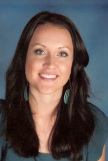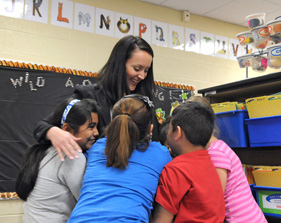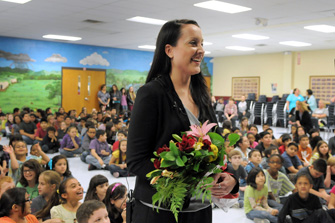 April Member of the Month Kimberly Reznicek is a board member of the Texas Association for Literacy Educators (TALE), an International Reading Association (IRA) state council, and an elementary reading specialist in San Antonio, the location of the IRA 58th Annual Convention. She is also an adjunct professor in the Teacher Education department at St. Mary’s University. As a part of the Reading Cadre for Staff Development, she collaboratively provides literacy related professional development to teachers within her district. Kimberly earned an Ed., MA from the Harvard Graduate School of Education in the Language and Literacy Program and a BA in Interdisciplinary Reading from St. Mary’s University. She has written items and research materials for ETS, CompassLearning, and the Center for Applied Linguistics. Her professional interests include adult dyslexia, vocabulary intervention programs, and Response to Intervention (RTI). In this interview, Reznicek shares more about her various roles, must-see San Antonio attractions, and kickball.
April Member of the Month Kimberly Reznicek is a board member of the Texas Association for Literacy Educators (TALE), an International Reading Association (IRA) state council, and an elementary reading specialist in San Antonio, the location of the IRA 58th Annual Convention. She is also an adjunct professor in the Teacher Education department at St. Mary’s University. As a part of the Reading Cadre for Staff Development, she collaboratively provides literacy related professional development to teachers within her district. Kimberly earned an Ed., MA from the Harvard Graduate School of Education in the Language and Literacy Program and a BA in Interdisciplinary Reading from St. Mary’s University. She has written items and research materials for ETS, CompassLearning, and the Center for Applied Linguistics. Her professional interests include adult dyslexia, vocabulary intervention programs, and Response to Intervention (RTI). In this interview, Reznicek shares more about her various roles, must-see San Antonio attractions, and kickball.
When did you know you wanted to become a teacher?
When I was a junior in high school I participated in a volunteer program that allowed us to read with students in elementary schools. I worked in a second grade classroom at Brackenridge Elementary, a Title I school, with two students who struggled with reading. After working with them and seeing the light in their eyes when suddenly they understood a concept or read a word correctly, I knew that this was the career for me. School was always a positive experience for me, and now I want my students to have the same positive experiences.
As a literacy educator how do you motivate students, especially students who are struggling, to want to read?
Reading specialists have different roles and thus different relationships with students than do classroom teachers. Classroom teachers have much more time with their students to get to know them and form relationships. When I first became a specialist I missed those relationships. As a specialist I have 30- to 45-minute sessions with each small group, and then I move on to the next group. However, I discovered that my different role can be positive in the way of student-teacher interaction. Sometimes as a classroom teacher you feel like a parent to your students, including times when you have to discipline students and require them to do things they may not want to do. As a specialist I feel like the “fun aunt” that gets to spend time with my students letting them “play” and take a break from their routine. While my students are really learning, they feel like they are playing because I believe novelty keeps the experience interesting. I always have new and different “toys” for them to use to extend their reading learning. My students think it is a real treat when they get to write on the table with dry erase markers or use magna doodle boards, magnetic letters, pipe cleaner, and various other materials that keep students engaged.
Using engaging texts or setting the stage to make texts seem engaging is another way I try to keep students interested. I start every year by reading Stephen Parlato’s The World That Loved Books. Its beautiful collages illustrate how reading envelopes you into other worlds. The students love the illustrations and see from the start that reading can take you places. I treat each book we read in our group with this attitude and hope that my students develop a similar appreciation for the joy and practicality that reading can bring.
 Beyond the materials I use, I feel that having quality relationships with students is important. When students enter my classroom they can have a new identity apart from that of in their classroom or at home. They are encouraged to share their stories to make connections to the texts. They are encouraged to help each other by teaching other the reading skills and strategies they know. They are recognized for their accomplishments by earning the status of Reader of the Week. If they are chosen as Reader of the Week they get to sit in our special Reader’s Chair, wear their safari hat, and help with various tasks I might request. My students strive for this honor and focus their efforts toward being the Reader of the Week. Since beginning this process, my students are noticeably working together to use their strategies. They ask their reading partners “Does that make sense?” or “What sound does that letter make?” It has been a great way of encouraging the use of effective reading strategies as well as positive behaviors in my room.
Beyond the materials I use, I feel that having quality relationships with students is important. When students enter my classroom they can have a new identity apart from that of in their classroom or at home. They are encouraged to share their stories to make connections to the texts. They are encouraged to help each other by teaching other the reading skills and strategies they know. They are recognized for their accomplishments by earning the status of Reader of the Week. If they are chosen as Reader of the Week they get to sit in our special Reader’s Chair, wear their safari hat, and help with various tasks I might request. My students strive for this honor and focus their efforts toward being the Reader of the Week. Since beginning this process, my students are noticeably working together to use their strategies. They ask their reading partners “Does that make sense?” or “What sound does that letter make?” It has been a great way of encouraging the use of effective reading strategies as well as positive behaviors in my room.
Beyond recognition I also want my room to be a safe place for students. If they are having a bad day, are nervous about a test, or want to share details of their lives, my students come to me and talk freely. I think they know that they can trust me and the students in our group because we have formed a different bond that may not have been able to be formed in a larger group setting.
Using engaging texts and materials, recognizing students’ efforts, and maintaining positive relationships with and among students helps struggling readers to improve their skills and to be motivated to read within our groups.
You tutored with Each One Teach One (EOTO), a non-profit organization serving low-level adult learners seeking basic literacy or GED certification. How has your volunteer work affected your career?
I tutored with Each One Teach One for a year and continue to maintain a relationship with the organization. Working with these adult students helped me to focus my work at the elementary level. Many of the adults I worked with shared their stories of not learning how to read in elementary school or moving around frequently as a child creating educational gaps. Some even suspect they have unidentified learning disabilities. While each adult student I have worked with is incredibly driven to succeed in life and gain the skills necessary, they have explained the struggles they have faced along the way. One student described the shame he felt in being unable to help his own children with their homework. One student took time off from work and a significant pay cut to be able to focus on his work with EOTO. One woman explained her struggles with substance abuse as an escape because she felt she had no other options. While each student is now furthering their education, I know there are plenty of other adults with similar situations who may not have the means or knowledge of the resources available to obtain the help they need.
 As an elementary educator, these stories are a reminder to me how important it is to prevent our young students from ending up in situations like those of the adults. If we, as educators, can set our children up for academic success at an early age, by teaching them to read, think, and problem-solve, then those children will not face as many difficulties later in life. If we can identify any potential struggles they might have like learning disabilities, then we can provide early intervention enabling students to cope with and adjust to their different ways of learning. Working with Each One Teach One was an invaluable experience to me as an educator. I would encourage anyone, educator or otherwise, to consider working with the organization. It helps you to focus on the purpose of the work you do and to understand others in their specific life situations. It promotes compassion and empathy for the people with which you work. You understand the similarities that we all have in life regardless of our situational differences.
As an elementary educator, these stories are a reminder to me how important it is to prevent our young students from ending up in situations like those of the adults. If we, as educators, can set our children up for academic success at an early age, by teaching them to read, think, and problem-solve, then those children will not face as many difficulties later in life. If we can identify any potential struggles they might have like learning disabilities, then we can provide early intervention enabling students to cope with and adjust to their different ways of learning. Working with Each One Teach One was an invaluable experience to me as an educator. I would encourage anyone, educator or otherwise, to consider working with the organization. It helps you to focus on the purpose of the work you do and to understand others in their specific life situations. It promotes compassion and empathy for the people with which you work. You understand the similarities that we all have in life regardless of our situational differences.
You're part of the Reading Cadre for Staff Development. How is that group structured, and what kinds of projects do you do?
The NISD Elementary Reading Cadre is a group of elementary reading specialists that creates and presents staff development and trainings on reading topics. Trainings are presented in multiple formats including campus staff development sessions, district-wide invitations like Elementary Institute and Fall into Literacy, as well as webinars presented online throughout the district. We are led by Susan Smeby, the Reading Instructional Support Teacher, and overseen by Carolyn Denny, the Elementary Reading Instructional Specialist. The cadre meets once a month to continue our current book study of Lucy Calkins’ The Art of Teaching Reading as well as our breakout groups working on various staff development topics. I recently completed working on a webinar focusing on summarization strategies. While the district benefits from the work we do, I feel that I receive a lot of the benefits, too. Every month I look forward to the discussions we have about literacy and the camaraderie among the specialists. I feel that every district should have some sort of structure working toward similar purposes.
How has professional development changed in recent years, and where do you see it going in the future?
In NISD the biggest change I have seen is the use of technology. Webinars are used much more frequently and make staff development more accessible to larger groups of people. In the future I think online training will be much more frequent, but improved technology will allow for even more interaction and higher quality training.
What’s the most valuable advice you can give to someone entering the literacy education field?
The best advice I can give to anyone entering the education field in general is to remember why you entered into it. There can be a lot of distractions from all sides that might cause frustration or even displacement of one’s goals. However if you remember the reason you are there, the distractions will not deter you from your purpose.
What do you consider to be your proudest career moment?
I was recently named a finalist for the HEB Excellence in Education Rising Star Award. I do not typically look to awards to feel fulfilled as an educator but it was nice to be recognized for the work I have done and the work we all do with our students. It was really a recognition of my students’ accomplishments and the accomplishments of the people I have the privilege of working with and for on a daily basis. My students work so hard at becoming great readers. My colleagues and bosses are such fantastic educators and together we all work to ensure that our students are succeeding in school and in life. It was a nice celebration of what we all strive to do in schools.
What do you like to do when you’re not wearing your educator hat?
I like to spend time with my large extended family. I paint when I can find the time. I also play kickball in a social sports league with some of my friends who are also teachers. We don’t play enough kickball at recess.
Kimberly also shared her favorite San Antonio restaurants, shopping spots, and Fiesta events with Reading Today Online.